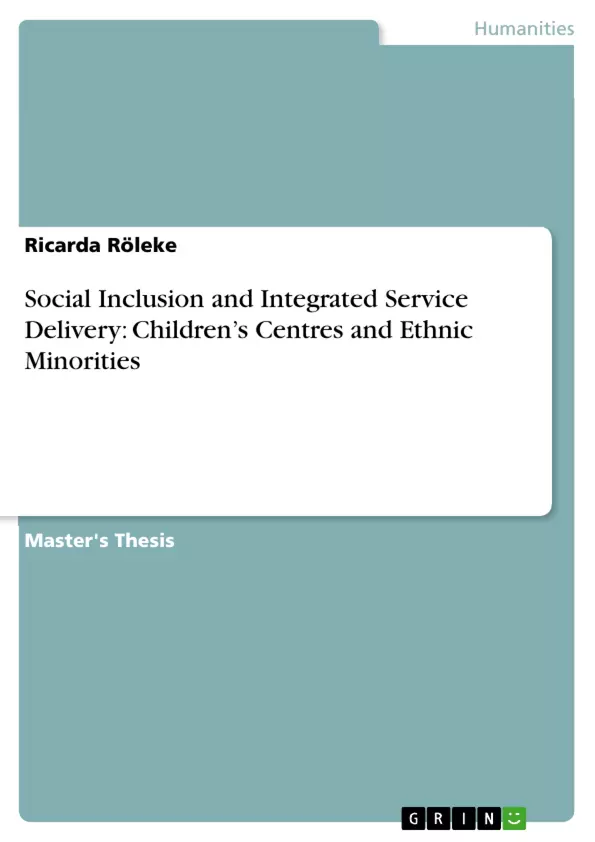It is widely acknowledged that family factors have a decisive impact on children’s opportunities in life. Following its landslide victory in 1997, New Labour initiated Sure Start, a cross-departmental programme intended to combat child poverty and social inequality by providing comprehensive family-centred services to children in pre-school age and their families. First evidence, however, points to significant difficulties in reaching minority ethnic families. This paper seeks to explore conditions for engaging effectively with minority ethnic families in Sure Start Children’s Centres. Effective engagement is defined as provision which is accessible to as well as inclusive of users and has positive outcomes measured against policy, practitioner and user objectives. Given the significant diversity of ethnic groups and limitations of previous research, existing evidence on ethnicity and Early Years provision is complemented by findings of a case study on the experience of Somali parents in a South London Community. It will be argued that Children’s Centres’ potential for effective engagement can be enhanced through a) considering individual/ethno-specific factors as well as regulatory and physical contexts in service design; b) well-trained staff and adequate resourcing; and c) actively involving parents in service planning, delivery and evaluation. It will also be suggested that the ability to offer inclusive services is constrained by systemic tensions arising from the rapid expansion of service provision and the underlying target and performance management model.
Inhaltsverzeichnis (Table of Contents)
- Introduction
- Developing a Concept of Effective Engagement
- Ethnicity and Effective Engagement - Research Evidence from the Early Years
- Individual factors:
- Structural factors:
- Effective Engagement and Sensitive Service Design
- Integrated Children's Centres - The Background
- Turning to Practice: Engaging Effectively with Somali Parents
- Preliminary Remarks and Methodology
- Service Engagement of Somali Parents – External Factors
- Individual
- Ethnicity
- Environment
- Service Engagement of Somali Parents - Centres' Response
- Accessibility
- Inclusion
- Outcomes
- Concluding remarks
Zielsetzung und Themenschwerpunkte (Objectives and Key Themes)
This paper examines the conditions necessary for effectively engaging with minority ethnic families in Sure Start Children's Centres in England. It defines effective engagement as accessible and inclusive provision that produces positive outcomes for users. The paper draws on existing research on ethnicity and Early Years provision, as well as a case study on the experiences of Somali parents in a South London community.
- The impact of family factors on children's opportunities
- The challenges of reaching minority ethnic families in Sure Start programmes
- The need for sensitive service design to address both individual and structural factors
- The role of staff training and resourcing in effective engagement
- The importance of involving parents in service planning, delivery and evaluation
Zusammenfassung der Kapitel (Chapter Summaries)
The introduction highlights the significant impact of family factors, such as social class, household structure, and ethnicity, on a child's development and future opportunities. The paper also acknowledges the growing concern about the underrepresentation of minority ethnic families in Sure Start programs and the need for a more inclusive approach.
Chapter 2 explores the concept of effective engagement, defining it as accessible and inclusive provision that produces positive outcomes for users. It delves into the different dimensions of engagement, including accessibility, inclusivity, and outcomes, and emphasizes the importance of considering both individual and structural factors in service design.
Chapter 3 reviews existing research on ethnicity and effective engagement in the Early Years sector. It examines the individual and structural factors that influence the participation of minority ethnic families in Early Years programs, highlighting the importance of understanding the specific needs and challenges faced by different ethnic groups.
Chapter 4 provides an overview of the background and development of Integrated Children's Centres (ICCs) in England. It examines the government's Every Child Matters strategy and the role of ICCs in delivering comprehensive services to children and families. The chapter also touches on the challenges and opportunities of integrating different services under one roof.
Chapter 5 focuses on the experiences of Somali parents in a South London community, offering a case study of the challenges and opportunities for effective engagement with minority ethnic families. The chapter explores the external factors that influence the service engagement of Somali parents, including individual factors, ethnicity, and environmental factors.
Chapter 5 continues to explore the case study of Somali parents, analyzing the centre's response to the needs of this community. It examines the accessibility, inclusivity, and outcomes of services provided by the centre, highlighting both the strengths and weaknesses of the centre's approach.
Schlüsselwörter (Keywords)
This research focuses on engaging effectively with minority ethnic families in Sure Start Children's Centres in England. Key terms include: effective engagement, ethnicity, service design, accessibility, inclusivity, outcomes, individual factors, structural factors, Somali parents, case study, Early Years provision, Sure Start, Integrated Children's Centres, and the Every Child Matters strategy.
Frequently Asked Questions
What is the goal of Sure Start Children’s Centres?
Sure Start aims to combat child poverty and social inequality by providing comprehensive, family-centred services to preschool children and their families.
Why is it difficult to reach minority ethnic families?
Challenges include structural barriers, lack of culturally sensitive service design, and individual factors that may prevent families from engaging with standard provisions.
How can engagement with Somali parents be improved?
Effective engagement requires well-trained staff, adequate resourcing, and actively involving parents in the planning, delivery, and evaluation of services.
What does "effective engagement" mean in social inclusion?
It is defined as service provision that is both accessible and inclusive, resulting in positive outcomes for the users according to policy and practitioner objectives.
What systemic tensions exist in Children’s Centres?
Tensions arise from rapid expansion and a performance management model that focuses on targets, which can sometimes hinder the ability to offer truly inclusive services.
- Quote paper
- MSc Ricarda Röleke (Author), 2010, Social Inclusion and Integrated Service Delivery: Children’s Centres and Ethnic Minorities, Munich, GRIN Verlag, https://www.grin.com/document/196354



